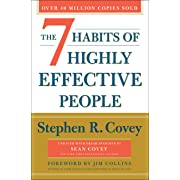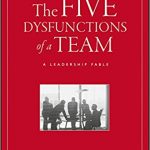 As part of my residency program, I’m required to do some reading. “The 7 Habits of Highly Effective People” by Stephen R. Covey was on my list. This book helped clarify some things in my life and changed my perspective on others. I believe this is the type of book that I will want to re-visit every few years as a refresher. Hopefully this review and summary will help you decide whether you should purchase and/or borrow your own copy to read for yourself.
As part of my residency program, I’m required to do some reading. “The 7 Habits of Highly Effective People” by Stephen R. Covey was on my list. This book helped clarify some things in my life and changed my perspective on others. I believe this is the type of book that I will want to re-visit every few years as a refresher. Hopefully this review and summary will help you decide whether you should purchase and/or borrow your own copy to read for yourself.
The book is broken down into the seven habits that Covey says are beneficial for successful people. He further categorizes these seven into four parts: paradigms/principles, private victory, public victory, and renewal. These habits and parts are helpful overview-type of concepts. If you’re looking for a book on how to organize your calendar, to-do list, and inbox, then this may not be the book for you. Covey does address some of these topics, but not in an in-depth fashion.
Habit 1: Be Proactive
The main thrust behind this habit is that being “proactive” is the opposite of being “reactive.” Being proactive takes responsibility for our circumstances. Being reactive blames people or our environment for our circumstances. If you want to be successful, begin proactive helps to not allow adverse circumstances to affect your outlook on your own future.
Habit 2: Begin with the End in Mind
This habit is pretty self-explanatory. Beginning with the end in mind means that we have a clear vision of where we want to be in our future lives. Then, our behavior today, tomorrow, next week, next month all help us to fulfill the end goal that we have set.
Habit 3: Put first things first
Habit 3 is the practical fulfillment of Habits 1 and 2. Habit 1 says, “You’re the creator. You are in charge.” Habit 2 is the first or mental creation. It’s based on the ability to envision your future. Habit 3 is the physical creation—the fulfillment of what you have envisioned to be your future. This is also the chapter where Covey talks about creating a calendar. He suggests making a calendar a week at a time, even doing two weeks at a time. Write out your goals and things that need to get done, then fill in your calendar to get those things done, making sure that these things all have to do with your Habit 2 end goals. Sometimes tasks are urgent and require immediate attention. Most of the time, we waste time on what seems urgent but is not important.
Habit 4: Think Win/Win
This habit is about making sure that you and others you work with both have wins in your dealings. This applies to your children, spouse, employers, co-workers, employees and other friendship and business interactions. There should be a mutual benefit to all these relationships and interactions.
Habit 5: Seek first to understand then be understood
Covey explains that understanding is more than just listening and sympathizing. True understanding comes when you can empathize with the person you are communicating with. Once you truly understand where they are coming from, you can make better assessments and give helpful insights. The second part to this habit is, then, being understood. Once you understand someone, it is appropriate to explain where you are coming from. At this point, you’ve invested in the person and they know that you truly empathize with them. Now, they will be more likely to hear and understand your position.
Habit 6: Synergize
Synergy simply means “that the whole is greater than the sum of its parts” (p. 274). Synergy is creativity in communication, working together in ways that are not the norm. They involve being open and vulnerable, knowing that the end result is worth the risk.
Habit 7: Sharpen the saw
This last habit is all about taking time for yourself to intentionally go back and revisit the first six habits, sharpening your skills in the first six areas that Covey addresses. Covey talks about the upward spiral which includes learning, committing, doing, then, learning, committing, doing again and again, continually over our lifespans.
This book has been around since 1989, has helped thousands of people and will most likely continue to help thousands more. The habits in this book are areas where we can all use more work. Even if we are more proficient in some areas, we should go back and “sharpen the saw” with all of the habits from time to time.
If this review/summary was helpful to you, send me a message! If you would like to purchase a copy of “The 7 Habits of Highly Effective People” by Stephen Covey, you can purchase it here.





